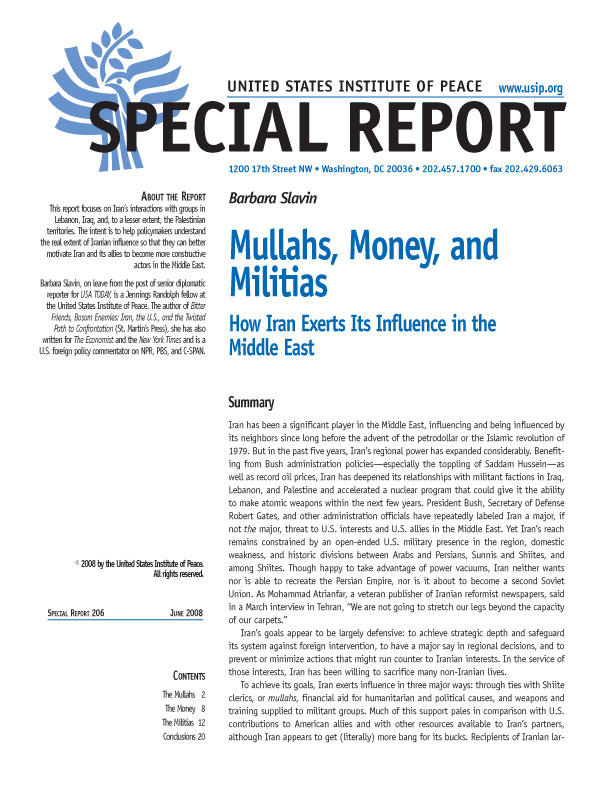Mullahs, Money, and Militias: How Iran Exerts Its Influence in the Middle East
This report focuses on Iran's interactions with groups in Lebanon, Iraq, and to a lesser extent, the Palestinian territories. The intent is to help policymakers understand the real extent of Iranian influence so that they can better motivate Iran and its allies to become more constructive actors in the Middle East.

Summary
Iran has been a significant player in the Middle East, influencing and being influenced by its neighbors since long before the advent of the petrodollar or the Islamic revolution of 1979. But in the past five years, Iran’s regional power has expanded considerably. Benefiting from Bush administration policies--especially the toppling of Saddam Hussein--as well as record oil prices, Iran has deepened its relationships with militant factions in Iraq, Lebanon, and Palestine and accelerated a nuclear program that could give it the ability to make atomic weapons within the next few years. President Bush, Secretary of Defense Robert Gates, and other administration officials have repeatedly labeled Iran a major, if not the major, threat to U.S. interests and U.S. allies in the Middle East. Yet Iran’s reach remains constrained by an open-ended U.S. military presence in the region, domestic weakness, and historic divisions between Arabs and Persians, Sunnis and Shiites, and among Shiites. Though happy to take advantage of power vacuums, Iran neither wants nor is able to recreate the Persian Empire, nor is it about to become a second Soviet Union. As Mohammad Atrianfar, a veteran publisher of Iranian reformist newspapers, said in a March interview in Tehran, "We are not going to stretch our legs beyond the capacity of our carpets."
Iran’s goals appear to be largely defensive: to achieve strategic depth and safeguard its system against foreign intervention, to have a major say in regional decisions, and to prevent or minimize actions that might run counter to Iranian interests. In the service of those interests, Iran has been willing to sacrifice many non-Iranian lives.
To achieve its goals, Iran exerts influence in three major ways: through ties with Shiite clerics, or mullahs, financial aid for humanitarian and political causes, and weapons and training supplied to militant groups. Much of this support pales in comparison with U.S. contributions to American allies and with other resources available to Iran’s partners, although Iran appears to get (literally) more bang for its bucks. Recipients of Iranian largesse, especially the Lebanese group Hezbollah, are not mere proxies and appear to have considerable tactical autonomy and influence on Iranian policies. Many Iraqis, including Shiite groups close to Iran, are trying to hedge their ties with Tehran by maintaining links to the United States. To contain harmful Iranian influence, the United States may have to act on a number of fronts, working to stabilize Iraq and Lebanon and to resolve the Arab-Israeli conflict without magnifying its own confrontation with Iran. The U.S. government should consider direct talks with Iran to try to constrain Iran’s motivation to further destabilize the region and should establish contacts, if possible, with some of Iran’s partners to increase U.S. options, knowledge, and flexibility.
About the Report
This report focuses on Iran’s interactions with groups in Lebanon, Iraq, and, to a lesser extent, the Palestinian territories. The intent is to help policymakers understand the real extent of Iranian influence so that they can better motivate Iran and its allies to become more constructive actors in the Middle East.
Barbara Slavin, on leave from the post of senior diplomatic reporter for USA TODAY, is a Jennings Randolph fellow at the United States Institute of Peace. The author of Bitter Friends, Bosom Enemies: Iran, the U.S., and the Twisted Path to Confrontation (St. Martin’s Press), she has also written for The Economist and the New York Times and is a U.S. foreign policy commentator on NPR, PBS, and C-SPAN.



